Why are world leaders racing to the Pacific Islands?
It’s not just the US and China. India, Indonesia, South Korea and others are scrambling for influence in a strategically vital region.
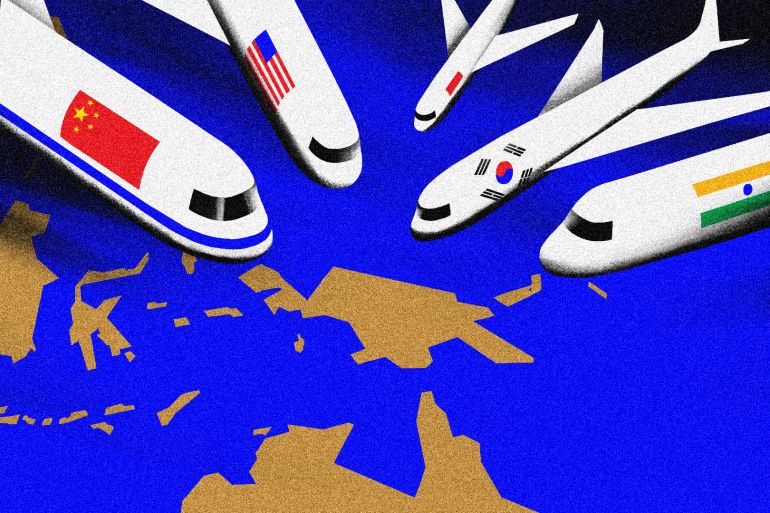
Papua New Guinea’s (PNG) Prime Minister James Marape is a busy host. Once a sleepy town, Port Moresby, the country’s capital, is now a buzzing diplomatic destination with VIP planes queueing up to land at its airport.
China’s recently reappointed Foreign Minister Wang Yi visited in June 2022, at the end of a trip to eight Pacific Island nations, while the United States Secretary of State Antony Blinken landed this May. And US Defence Secretary Lloyd Austin visited in the last week of July.
Keep reading
list of 4 itemsSpain’s Sanchez drama: After toying with resignation, PM draws criticism
Photos: Georgians ‘March for Europe’ in protest against controversial bill
Humza Yousaf resigns as Scotland’s first minister
But even as the mounting China-US struggle for influence over the Pacific region grabs headlines, the roster of arrivals to the largest regional economy outside Australia and New Zealand suggests a much broader rush to a long-ignored part of the world.
In May, Marape bent down to touch the feet of Narendra Modi as a gesture of respect for the Indian prime minister when he landed in Port Moresby. Two Indian warships docked in Papua New Guinea in August.
And in July, the PNG prime minister also shook hands with visiting Indonesian President Joko Widodo.
But it is not just Papua New Guinea attracting world leaders.
In late July, French President Emmanuel Macron travelled to PNG after also visiting New Caledonia, a French territory in the South Pacific, as well as Vanuatu.
In May, South Korea’s President Yoon Suk Yeol hosted the first-ever Korea-Pacific Islands Summit in Seoul, inviting about 12 leaders from the region to discuss maritime cooperation, climate change and energy security, among other issues. And representatives from Arab League countries as well as Pacific Island nations met and agreed in June to strengthen cooperation in environmental protection, investment and other sectors as part of the Riyadh Declaration issued in Saudi Arabia.
So, why is the world rushing to the Pacific Islands? Is this flush of interest simply a subplot to the China-US rivalry in the region? Or are there other reasons why countries want a toehold there? And do Pacific Island countries (PICs) gain anything from all of this?
The short answer: Countries like India, Indonesia and South Korea are seeking their own influence in a region critical to global shipping channels and the ocean economy – keen not to be left behind in the scramble for friends in the Pacific. Their outreach is principally about defending their national interests, rather than about siding with either of the global superpowers, analysts say. That approach works well for Pacific Island nations, giving them more partners to choose from and the chance to avoid getting trapped in a China-US tussle.
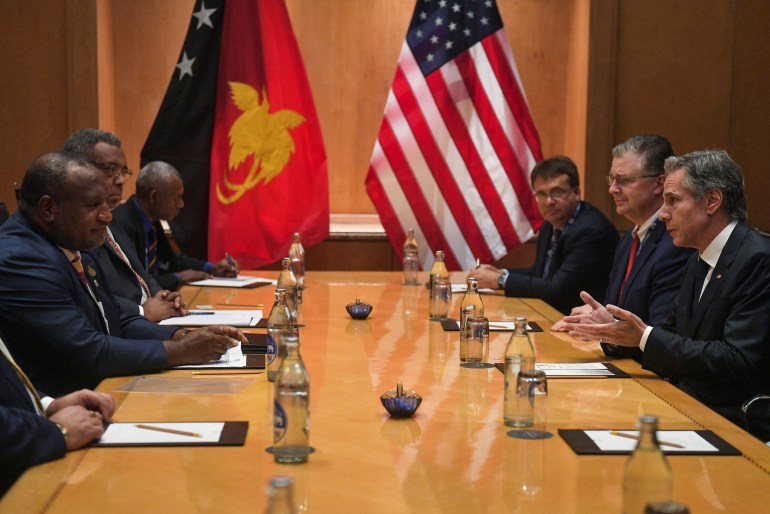
Great power race
The 14 Pacific Island countries – Papua New Guinea, Fiji, Palau, Tonga, Tuvalu, Samoa, Vanuatu, Micronesia, Kiribati, Nauru, the Marshall Islands, the Solomon Islands, Cook Islands and Niue – have traditionally been close partners of the US and its allies, in particular Australia, New Zealand and the United Kingdom.
Along with Australia, New Zealand and French overseas territories New Caledonia and French Polynesia, they are members of the Pacific Islands Forum (PIF), a grouping formed in 1971 to advocate for the shared interests of the region globally.
Yet, in recent years, geopolitical tensions have crashed along with the waves on the pristine beaches of the region. Four Pacific Island states – Palau, Tuvalu, Nauru and the Marshall Islands – currently recognise Taiwan over China.
That number was once larger but Beijing has used the promise of investments and trade to wean away Taipei’s partners in the region. In 2019, the Solomon Islands and Kiribati cut ties with Taiwan to recognise China instead.
The Solomon Islands in July signed a policing deal with China following a security pact the two inked in April, 2022. Since 2009, China has been the biggest lender to Pacific Island nations behind the Asian Development Bank and is a top trading partner.
In response, the US has stepped up its diplomatic and security presence in the region. It opened an embassy in the Solomon Islands capital Honiara in February and signed a new security pact with Papua New Guinea during Blinken’s visit in May.
Yet, other countries have been hustling to deepen their relations with Pacific nations too.
Their reasons vary but the geography of the Pacific Island nations makes them valuable partners, in particular, for nations looking to emerge as regional powers. They sit astride vital maritime shipping routes. Any future military conflict in the Indo-Pacific could make them key outposts where nations would want to dock and fuel ships.
And their vast exclusive economic zones – swathes of sea around a nation that only it can exploit economically – span large parts of the Pacific Ocean, making them potentially critical partners as countries look to the oceans for deep-sea minerals, food and more.
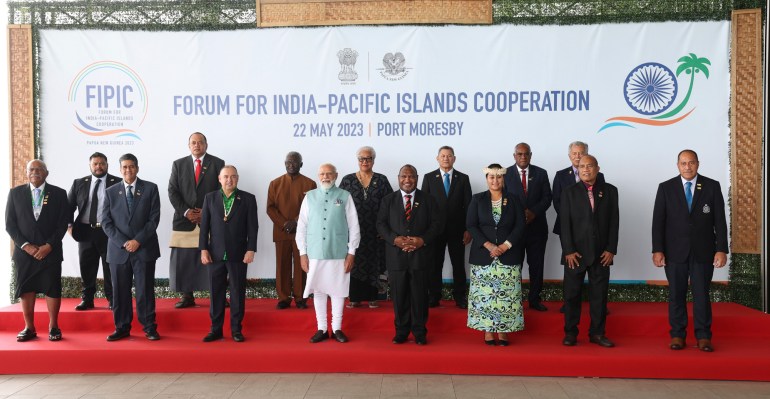
‘Not all about China’
Modi’s May visit to Papua New Guinea was not his first to the region.
In November 2014, Modi flew to Fiji for India’s first summit with the 14 Pacific Island nations. The last Indian prime minister to visit Fiji was Indira Gandhi 33 years earlier. Modi promised that New Delhi would be a “close partner of the Pacific Islands”. A second summit followed in 2015, in the Indian city of Jaipur, before the recent third summit in Port Moresby.
As New Delhi “aspires to become a major global power and a regional leader”, it “seeks to expand its diplomatic footprint and strengthen ties with countries that have traditionally been outside its purview,” Sana Hashmi, a Taipei-based fellow at the Taiwan-Asia Exchange Foundation, said.
India’s moves in the Pacific are often viewed internationally as “solely aimed at countering China or matching up with its activities”. That, she said, is a mistake.
Climate change is a key area of focus for India in its relations with the region. In 2014, Modi announced a $1bn climate adaptation fund for the region and India gives $200,000 in aid annually to each Pacific nation. During the COVID-19 pandemic, India supplied more than 100,000 vaccines to the Pacific and was a major contributor to the United Nations COVAXIN facility to provide subsidised shots to poorer nations.
And through a line of credit, India has helped Fiji modernise its sugar industry.
The world’s largest importer of palm oil, India imports large volumes of the kitchen staple from Papua New Guinea. In fact, India was the second-largest buyer of PNG’s palm oil in 2021, after the Netherlands. Indian gas companies, meanwhile, have shown an interest in PNG’s offshore gas projects.
“It is important to acknowledge that India’s actions in the region are mostly driven by its own national interests,” Hashmi, also a former consultant with India’s foreign ministry, told Al Jazeera. “After all, not everything revolves around, and is about, China.”
To be sure, India’s “pace of outreach has sometimes been slower than expected”, she said, despite efforts on both sides of the Indian Ocean. She cited the eight-year gap between the second India-Pacific Islands summit in 2015 and the third one in May as an example.
Still, even without summits, India has been busy trying to engage its newfound Pacific partners and highlighted that during the summit in Port Moresby. While countering China might not be India’s biggest priority in the region, New Delhi is very sharply trying to position itself as different from Washington and Beijing.
In a dig at China, which is often accused of trapping smaller nations in debt, India’s foreign secretary suggested New Delhi’s aid policy towards the Pacific Islands was fundamentally different. India’s assistance, he told reporters after the May summit, was “done in a manner which doesn’t cause increasing indebtedness of the society”.
Modi, meanwhile, appeared to contrast India’s quick supply of vaccines to Pacific nations during the pandemic with the slowness with which the US responded to requests for shots in 2021.
“Those whom we considered trustworthy, it turned out that they were not standing by our side in times of need,” Modi said in his address to Pacific leaders in Port Moresby in May. “I am glad that India stood with its Pacific Island friends during this challenging time.”
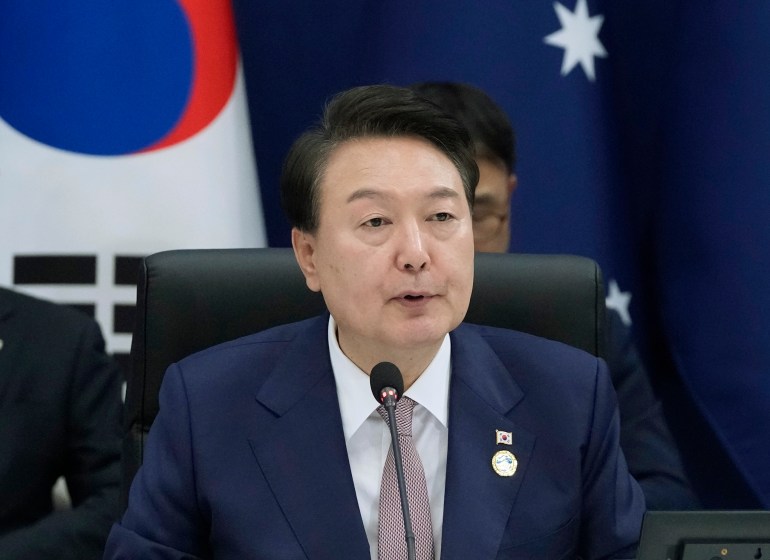
Korean calculus
India is not the only nation trying to create its own Pacific legacy in the shadow of the China-US competition.
The island nations have long been on the periphery of South Korea’s foreign policy priorities. Only 0.3 percent of the country’s imports come from Pacific Island nations.
But just as New Delhi is pushing for a multipolar approach in the Pacific, Seoul, too is now looking to carve out its own space in the region, keen to avoid getting left out in the superpower scramble for influence.
Joanne Wallis, an international security professor at the University of Adelaide, and Jiye Kim, an assistant professor of international relations at the Ritsumeikan Asia Pacific University in Japan, described South Korea’s policy as “looking for new neighbours in the Asia-Pacific region”, in an email to Al Jazeera.
South Korea can support the region through loans, grants, green technologies and in a low-carbon energy transition, they said.
Wallis and Kim recently co-authored an article on Seoul’s Pacific outreach for the Australian Strategic Policy Institute, in which they argued that while a close ally of the US, South Korea’s proximity to China meant it would not participate in direct containment of Beijing.
“While many may assume that Korea is acting in concert with the United States and its other partners in the region in the context of strategic competition with China, it is equally interested in developing its image as a middle power capable of projecting power in the Indo-Pacific region,” they said in their email.
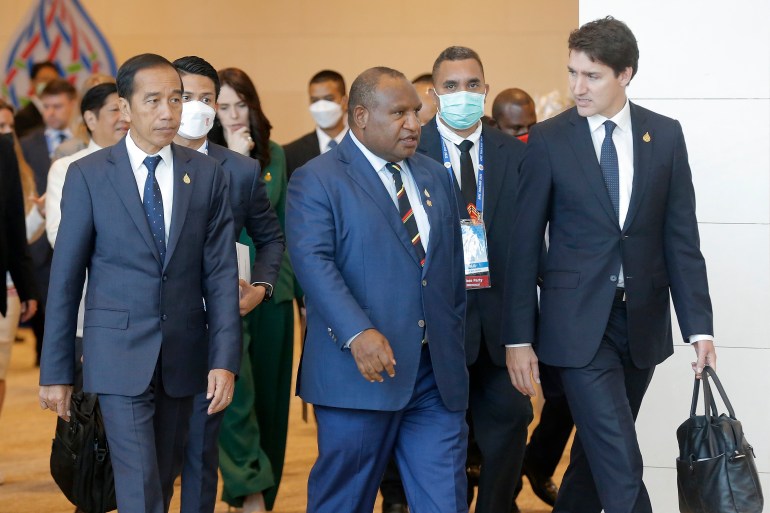
‘Middle power’ ambitions
Joining India and South Korea in shifting its gaze to the Pacific Islands is Indonesia, which last December hosted the first Indonesia Pacific Forum for Development in Bali.
“Especially with its status as a middle-power country, Jakarta must realise that there are many opportunities the Pacific can offer,” Baiq Wardhani, a lecturer at the Department of International Relations at Universitas Airlangga in Surabaya, Indonesia’s second-largest city, said, referring to Indonesia’s status as a regional powerhouse in Southeast Asia.
Like Modi, Indonesian President Widodo’s visit to Papua New Guinea in July was not his first to the region. He had also travelled to Port Moresby in 2015, while the prime minister of the Pacific Island nation visited Jakarta in 2022.
A decades-long conflict between Indonesia’s military and separatist rebels in Papua, a province that borders Papua New Guinea, has for long shadowed Jakarta’s relations with Pacific Island nations.
“Indonesia suffers from a poor image in this region, so all diplomatic efforts must be aimed at deconstructing Indonesia’s image so that Indonesia can be accepted by all countries in the Pacific, including Vanuatu,” Wardhani said.
In 2021, Vanuatu’s then-Prime Minister Bob Loughman used the United Nations General Assembly platform to criticise Indonesia. “In my region, the Indigenous people of West Papua continue to suffer from human rights violations,” he said.
Indonesia hit back at Loughman for those comments but the two nations have since tried to rebuild ties, with Vanuatu’s foreign minister visiting Jakarta this year. Vanuatu – among several Pacific Island nations – shares Melanesian roots with Papua’s Indigenous residents.
But Wardhani said the Pacific Island nations matter to Indonesia “not only due to the Papua issue”.
Despite their proximity, the Pacific Island nations are not major trade partners for Indonesia, which counts China, Japan, Singapore, the US and India as among its biggest markets.
While that will not change anytime soon, Indonesia should be willing to give much more than it gets from its small Pacific neighbours for the foreseeable future, Wardhani said. There might not be immediate economic gains from such an approach but it could yield valuable strategic benefits.
As Indonesia increasingly looks to increase its sphere of influence and project itself as a regional power, it needs recognition from countries in its neighbourhood to be taken seriously, she said.
With the Pacific Islands nations – long close to Australia, New Zealand and the broader West – opening up to others, Indonesia “must seize the opportunity to play a role”, Wardhani said.
“There is an actual asymmetrical relationship: Indonesia needs the Pacific more than the other way around.”
But what does all of this regional and global attention mean for the Pacific Island nations themselves?
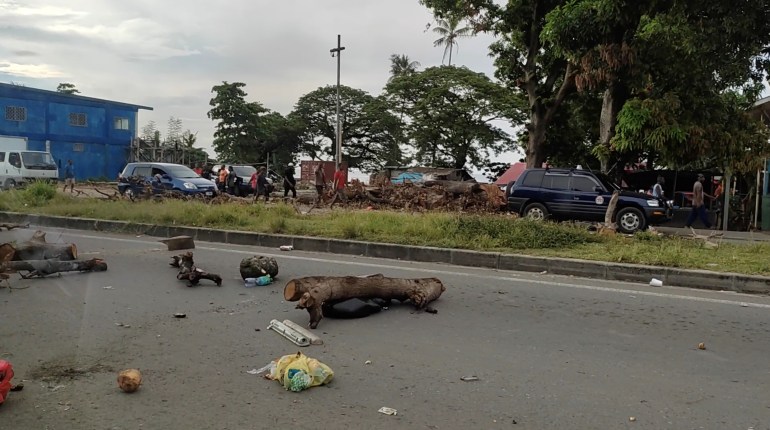
‘Our issues, our agenda’
With the geopolitical light shining on them, most Pacific Island nations are carefully trying to balance ties between the US and China, while making demands of both, keen to avoid getting trapped in an economic – or worse still, military – confrontation between the superpowers, according to analysts.
“Given the Pacific countries are small and vulnerable, they pursue a non-aligned foreign policy stance, engaging with all large countries’ will to pursue bilateral relationships, while simultaneously pursuing their interests,” Maholopa Laveil, an FDC Pacific Fellow at the Sydney, Austraia-based Lowy Institute think tank, told Al Jazeera.
One view in the region is that the China-US rivalry “has enabled the Pacific to attract attention and also attract more resources”, said Sandra Tarte, an associate professor in international relations at the University of the South Pacific in Suva, Fiji.
The region’s success in getting multiple major nations to focus on Pacific Island nations also points to a quiet confidence that this – in Tarte’s words – was an “opportunity” they can benefit from. More potential partners lining up with promises gives the island countries more choice and bargaining power.
Ultimately, Tarte said, “it’s not about military power; it’s not about dominance or whoever is in a position to call the shots.”
“It’s about our issues, our agenda.”